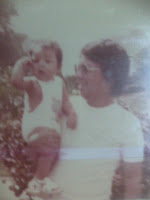August
25, 2012 (August 26 in the Philippines)--Today, Neil A. Armstrong, the first
man to set foot on the moon, passed away. He was 82 years old.
I
grew up in the latter part of the Space Age. Just as the big thing now in the
Information Age are computers and the Internet, the big thing back then is
outer space and space flight. Science fiction reflected this zeitgeist: television
programs like Star Trek and movies like Star Wars. My brother and I used to
watch reruns of Star Trek: The Original Series (TOS) in the 80's; as well as
the Star Trek movies (The Motion Picture, The Wrath of Khan, In Search for
Spock, The Voyage Home, and The Final Frontier). Then in the 90's, we became
enthusiasts of Star Trek: The Next Generation (TNG) as well as its feature
films (Generations, First Contact, Insurrection--we did not see Nemesis). We
also became a fan of Star Wars, both the original trilogy (A New Hope, The
Empire Strikes Back, Return of the Jedi) and the prequel trilogy (The Phantom
Menace, Attack of the Clones, Revenge of the Sith).
When
I was growing up, I had a lot of books on outer space and space flight. My
brother and I built toy spaceships out of Lego. I remember that I used to have
a poster of the Solar System by my bed. I would buy National Geographic
magazines that featured space missions--I became a fan of the Space Shuttle. I
would read about American and Soviet space flights, manned and unmanned. By the
third grade, I wanted to be an astronaut. Yes, that's how big a nerd I am.
Obviously,
I still wasn't around when the Apollo 11 astronauts went to the moon in July
1969. My mother said that that year she just graduated from college and she was
at her first job when she listened to the moon landing over the radio. (This was also the same month and year went Gloria Diaz won the Miss Universe 1969 pageant.) But my
brother and I was able to watch it on television during an anniversary of the
mission. I also remember reading about the Apollo 11 mission on Reader's Digest:
Buzz Aldrin had Communion on the moon; and when they broke the switch that arms
the ascent engine of the Lunar Module, they used a fountain pen to push the
switch.
I
once bought a book entitled Moondust: In Search of the Men Who Fell to Earth by
Andrew Smith (HarperCollins, 2005). When I heard of the death of Neil
Armstrong, I immediately took out the book and read the chapter on the first
man on the moon. It tells of how the Soviets beat the US into space by
launching Sputnik I. Thus, President Dwight D. Eisenhower converted a
then-obscure government agency into NASA, the National Aeronautics and Space
Administration. Then President John F. Kennedy declared that before the 60's
was out, NASA will have placed a man on the moon and returned him safely back to
Earth. Thus, the Space Race, a manifestation of the Cold War, was on.
The
book portrays Armstrong as a reserved, tight-lipped, but very intelligent person.
It relates of how he grew up in Wapakoneta, Ohio; of how joined the US Navy and
flew combat missions in the Korean War; of how he joined NASA on the second
cadre of astronauts; of how he flew the supersonic X-15 planes, which were
launched from under the wings of B-52 bombers; of how he went up on the Gemini
8 mission with David Scott, where they demonstrated how a spacecraft can dock
with another vehicle in space; and of how he was providentially chosen to be the
commander of the first mission that would land man on another celestial body.
It also tells of after returning to Earth, he became a college professor,
teaching aeronautics engineering at the University of Cincinatti. (How would
you like to have a professor who was a spaceman?) It also tells of a rare
appearance of the great man at a reunion dinner where the author was able to
have a word with him.
When
Neil Armstrong died, I was saddened; not just because of the loss of a great man,
but because of the seeming apathy about space in general. Nobody seems to care
about space anymore. Perhaps because the space program is seen as a
superfluous, frivolous, and expensive enterprise. When the Space Shuttle was
retired, nobody gave a hoot. Maybe people thought, with all of the problems
here on Earth, why should we throw time, people, and money to outer space?
In
the movie Star Trek: First Contact, an evil race of alien cyborgs called the
Borg travels back in time (from the 24th century) to 21st century Earth, just
after the Third World War. Their mission: to keep Zefran Cochrane (James Cromwell), the inventor
of warp drive (an engine that enables spaceships to travel faster than light)
from making his historic space flight, which paved the way for contact with the
Vulcans--an event called First Contact. It is up for the crew of the
Enterprise-E, led by Captain Jean-Luc Picard (Patrick Steward) to stop the Borg
and to ensure First Contact would happen. In one part of the movie, Lily Sloane, an assistant
of Cochrane, had to be taken up to the Enterprise for medical treatment. She
asked the captain how much money did it take to construct such a huge starship.
Captain Picard answers:
"The economics of the future is somewhat different. You see, money doesn't exist in the 24th century... The acquisition of wealth is no longer the driving force in our lives. We work to better ourselves and the rest of humanity."
Perhaps
it's time for humankind to look to the heavens once more.
Requiescat
in pace, Neil A. Armstrong. I'll be honoring your memory by watching Transformers: Dark of the Moon (which features the real
Buzz Aldrin; and has the Apollo astronauts secretly explore a lost
Autobot spaceship--really cool) and Star Trek: First Contact.


















